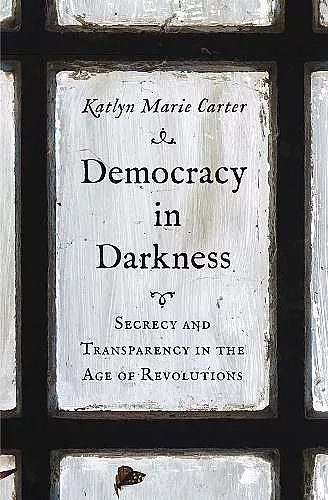Democracy in Darkness
Secrecy and Transparency in the Age of Revolutions
Format:Hardback
Publisher:Yale University Press
Published:9th Jan '24
Should be back in stock very soon

How debates over secrecy and transparency in politics during the eighteenth century shaped modern democracy
“Thought-provoking. . . . As Carter’s history shows with wonderful nuance, democratic governance is about a process of ongoing negotiation, not merely being in the know.”—Bronwen Everill, Foreign Policy
Does democracy die in darkness, as the saying suggests? This book reveals that modern democracy was born in secrecy, despite the widespread conviction that transparency was its very essence.
In the years preceding the American and French revolutions, state secrecy came to be seen as despotic—an instrument of monarchy. But as revolutionaries sought to fashion representative government, they faced a dilemma. In a context where gaining public trust seemed to demand transparency, was secrecy ever legitimate? Whether in Philadelphia or Paris, establishing popular sovereignty required navigating between an ideological imperative to eradicate secrets from the state and a practical need to limit transparency in government. The fight over this—dividing revolutionaries and vexing founders—would determine the nature of the world’s first representative democracies.
Unveiling modern democracy’s surprisingly shadowy origins, Carter reshapes our understanding of how government by and for the people emerged during the Age of Revolutions.
“An elegant synthesis of history and political theory that speaks directly to the parlous condition of many liberal democracies today.”—Adam Coleman, Times Literary Supplement
“Thought-provoking. . . . This book will be eye-opening for anyone with a passing interest in contemporary politics. . . . As Carter’s history shows with wonderful nuance, democratic governance is about a process of ongoing negotiation, not merely being in the know.”—Bronwen Everill, Foreign Policy
“The achievement of Democracy in Darkness . . . is to throw into relief the complexity and relevance of the relationship between the principle of sovereignty, political representation, publicity, public opinion, demagoguery, and the press as it played out in the history of the American and French Revolutions.”—Minchul Kim, European History Quarterly
“The achievement of Democracy in Darkness . . . is to throw into relief the complexity and relevance of the relationship between the principle of sovereignty, political representation, publicity, public opinion, demagoguery, and the press as it played out in the history of the American and French Revolutions.”—Minchul Kim, European History Quarterly
Winner of the Society for French Historical Studies 2024 Gilbert Chinard Book Prize
Shortlisted for the 2024 Edwards Book Award, sponsored by the Rodel Institute
“In her insightful, inspirational, and sometimes ironic analysis, Katlyn Carter demonstrates why demands for open government proved so appealing to proponents of representative democracy, yet also so troubling to those who understood why secrecy in deliberation often had decided advantages.”—Jack N. Rakove, author of Original Meanings: Politics and Ideas in the Making of the Constitution
“Democratic political cultures are fragile. They can die in darkness as we so frequently hear today, but as Katlyn Carter shows in this nuanced history, sunlight can both illuminate AND burn. Carter’s fascinating excavation of this trans-Atlantic, eighteenth-century conversation about transparency and trust offers no easy answers for the challenges the world’s democracies face today, but it teems with illuminating insights that might help us chart a path to a brighter future.”—Seth Cotlar, author of Tom Paine’s America
“In Democracy in Darkness, Katlyn Carter uncovers a central paradox of modern democratic governance: transparency is promised, but secrecy is essential to its effective functioning. Her telling of how political leaders in eighteenth-century France and the new United States respectively navigated that paradox makes for fascinating and, in this moment of democratic precarity, essential reading.”—Sophia Rosenfeld, author of Democracy and Truth: A Short History
“A revelatory work of trans-Atlantic history that shows how the practice of government secrecy became an essential element of representative democracy. This book fundamentally rewrites the story of how modern politics emerged during the American and French Revolutions.”—Nathan Perl-Rosenthal, University of Southern California
“By interweaving themes of political transparency and secrecy in late eighteenth-century America and France, Katlyn Marie Carter manages to illuminate the revolutions, each in ways that resonate unsettlingly with the current political climate.”—Colin Jones, author of The Fall of Robespierre
“Katlyn Carter explores the age of revolution from an unexpected angle, asking how closely revolutionaries from Paris, Kentucky to Paris, France adhered to their republican ideals by opening their assemblies and documents to ‘the public’—and how they defined that key term.”—Woody Holton, author of Liberty Is Sweet: The Hidden History of the American Revolution
ISBN: 9780300246926
Dimensions: unknown
Weight: unknown
392 pages